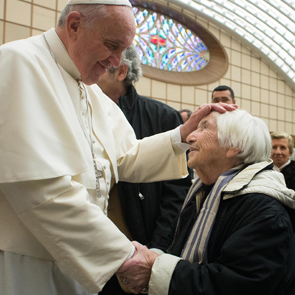In his annual message to the diplomatic corps at the Vatican this morning, Pope Francis delivered a message of almost unremitting darkness regarding the current state of the world.
He began his address by evoking an image from an icon by the mediaeval Russian iconographer Andrei Rublev (c1360-c1430). The Nativity icon shows the child Jesus lying not in a manger but in a tomb, foreshadowing the entire drama of Jesus’ life.
The Christmas stories show the “hardened heart of humanity”, the Pope said, and so do contemporary events across the globe. He compared Herod’s slaughter of the innocents to the recent slaughter “with unspeakable brutality” of more than 100 schoolchildren in Pakistan.
He identified a widespread “culture of rejection” most recently illustrated in the “tragic slayings” which took place in Paris last week in which 17 people were murdered by Islamist terrorists, though he made no reference to Islam. Other people “are no longer regarded as beings of equal dignity, as brothers or sisters sharing a common humanity, but rather as objects”, the Pope said, quoting from his World Day of Peace message of this year.
He referred to a “culture of enslavement” associated with “never-ending conflicts … like a true world war fought piecemeal” and appealed for an end to hostilities in Ukraine, for a two-state solution to the Israel-Palestine conflict, and linked the spread of “fundamentalist terrorism” in Syria and Iraq to our “throwaway culture being applied to God”.
“Religious fundamentalism, even before it eliminates human beings by perpetrating horrendous killings, eliminates God himself, turning him into a mere ideological pretext,” he said.
Francis appealed to all religious, political and intellectual leaders, particularly “those of the Muslim community”, to condemn all interpretations of religion that attempt to justify acts of violence.
Without naming the Islamist group Boko Haram, he linked the atrocities in Nigeria – 2,000 people were slaughtered around 3 January near the border with Chad in the worst atrocity to date – to the “abominable trade” of trafficking. Other African countries suffering under the scourge of conflict included Libya, Sudan, South Sudan, and Democratic Republic of Congo, and associated with these wars was always “the horrendous crime of rape”.
In a rare moment of light he praised “those healthcare workers who, alongside men and women religious and volunteers” were caring for Ebola victims in Sierra Leone, Liberia and Guinea. But he immediately returned to the plight of migrants and asylum seekers, foreshadowed in the flight of the Holy Family to Egypt “which sheds light on another form of the throwaway culture which harms relationships and causes the breakdown of society”. “We need to take action against the causes and not only the effects”, he said quoting from his address to the European parliament last November.
Concluding, he returned to the plight of the “hidden exiles” living in our homes and in our families, especially the elderly, the handicapped and young people. The elderly are often considered a “burdensome presence” while the young often suffer from the “scourge of rising unemployment”, while there is at the same time “the dramatic situation of so many workers, especially children, who are exploited out of greed”.
Pope Francis identified as a main cause of these realities “a model of globalisation which levels out differences and even discards cultures, cutting them off from those factors which shape each people’s identity and constitute a legacy essential to their sound social development”.
In a final attempt to lift the discourse out of pessimism, he said he found in Albania last September “a nation full of young people who represent hope for the future… in an atmosphere of respect and mutual trust between Catholics, Orthodox and Muslims”.
This led him to refer to the 70th anniversary of the UN, which will be celebrated this year, and whose headquarters in New York he is expected to visit when he travels to the United States in September. He summed up his message with a quote from the address of Pope Paul VI to the UN in October 1965: “It is peace, peace, that has to guide the destiny of the nations of all mankind.”
Above: Pope Francis greets an Auschwitz survivor. Photo: CNS/L'Osservatore Romano via EPA




 Loading ...
Loading ...